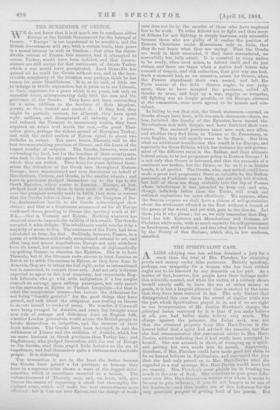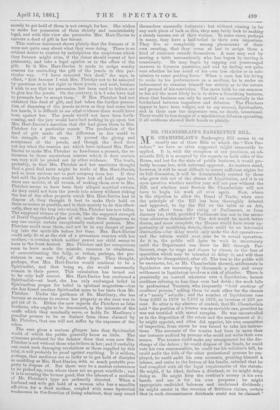THE SPIRITUALIST CASE.
ALESS edifying case has seldom detained a jury for a week than the trial of Mrs. Fletcher, for obtaining jewels and money under false pretences. Strictly speaking, perhaps, our sympathy for a woman who has been robbed ought not to be lessened by any demerits on her part. As a matter of fact, however, few people have their feelings under this scientific control, and when the victim of a robbery shows
herself utterly unfit to have the use of either money or goods, it is but a languid pleasure that is excited by the news that they have been restored to her. The only feature that distinguished this case from the crowd of similar trials was the part which Spiritualism played in it, and if we are right in our interpretation of Mr. Justice Hawkins's charge, the principal lesson conveyed by it is that if you make believe at all, you had better make believe very much. The charge against the prisoner, the Judge said, was not that she obtained property from Mrs. Hart-Davies in the honest belief that a spirit had advised the transfer, but that she had communicated this convenient advice to Mrs. Hart- Davies, without believing that it had really been conveyed to herself. She was accused, in short, of trumping up a spirit, and putting her own words into its mouth. Apparently, therefore, if Mrs. Fletcher could have made good her claim to be an honest believer in Spiritualism, and convinced the jury that she had only passed on to Mrs. Hart-Davies what she regarded as a real message, Mrs. Hart-Davies would have had no remedy. Mrs. Pletcher's error plainly lay in trusting too much to the arm of flesh. She contrives to gain great influ- ence over Mrs. Hart-Davies—a woman over whom it seems to be easy to gain influence, if you do not happen to be one of her husbands—and then snakes use of this influence for the very practical purpose of getting hold of her jewels. But merely to get hold of them is not enough for her. She wishes to make her possession of them strictly and unmistakably legal, and with this view she persuades Mrs. Hart-Davies to execute a deed of gift in her favour. This curious document shows plainly that the framers of it were not quite easy about what they were doing. There is an
evident desire to combat by anticipation the suspicions which they foresaw might arise, if the donor should repent of her generosity, and take a legal opinion as to the effect of the
gift. In it Mrs. Hart-Davies is made to assign sundry reasons for rescinding the gift of the jewels in this par- ticular way. " I have executed this deed," she says, in effect, " first because I wish Mrs. Fletcher not to be annoyed by questions as to her right to these jewels ; and next, because I wish to say that na persuasion has been used to induce me to give her the jewels. On the contrary, it is I who have bad to persuade her to accept them." If Mrs. Fletcher had not obtained this deed of gift, and had taken the further precau- tion of disposing of the jewels as soon as they had come into her hands, it is difficult to see what evidence there would have been against her. The jewels would not have been forth- coming, and the jury would have had nothing to go upon but
Mrs. Hart-Davies's assertion that she had given them to Mrs. Fletcher for a particular reason. The production of the
deed of gift made all the difference in the world to
the strength of the case. It proved the giving and acceptance of the jewels, and though the deed does not say what the reasons are which have induced Mrs. Hart- Davies to make Mrs. Fletcher so handsome a present, the re- ferences to these mysterious reasons which it does contain can very well be pieced out by other evidence. The truth, probably, is that Mrs. Fletcher and her associates thought that a good deal more might be made of Mrs. Hart-Davies, and so were anxious not to part company from her. If they had sold the jewels they would have lost all hold upon her, since one motive, at all events, of making them over to Mrs. Fletcher seems to have been their alleged mystical virtues. As they could not turn the jewels into money without risking the loss of the other property which Mrs. Hart-Davies had to dispose of, they thought it best to make their hold on them as secure as possible, and in their anxiety to do this effect- ually, they set the trap into which Mrs. Fletcher has now fallen. The supposed virtues of the jewels, like the supposed strength of David Copperfield's glass of ale, made them dangerous to any one except certain exceptionally endowed persons. Mrs. Fletcher could wear them, and not be in any danger of pass- ing into the spirit-life before her time. Mrs. Ilart-Davies. could only do so at the risk of a premature reunion with her mother,—a reunion which neither parent nor child seems to have in the least desired. Mrs. Fletcher and her companions seem to have made the mistake, common to charlatans, of over-estimating the folly, or rather, perhaps, the per- sistence in any one folly, of their dupe. They thought, perhaps, that Mrs. Hart-Davies would continue to be a Spiritualist., and that being so, she would necessarily remain in their power. This calculation has turned out to be only half correct. Mrs. Hart-Davies has continued a Spiritualist--at least, she has only exchanged belief in Spiritualism proper for belief in spiritual magnetism—but she has found another Spiritualist more to her taste than Mr. Fletcher. Under the guidance of Dr. MacGeary, she has become as anxious to recover her property. as she once was to get rid of it. Either she now regards the Fletchers as false brethren, who ought to be denounced, in the interests of the calla which they nominally serve, or holds Dr. MaoGeary's peculiar powers to be so distinct from those claimed by Mr. Fletcher, that one will not suffer by the exposure of the other.
The case gives a curious glimpse into that Spiritualist world of which the public generally know so little. The witnesses produced for the defence show that even now Mrs. Fletcher is not without those who believe in her ; and if credulity can resist such damaging revelations as those supplied by this trial, it will probably be proof against anything. It is seldom, perhaps, that mediums are so lucky as to got hold of disciples as confiding as Mrs. Hart-Davies, with so much portable pro- perty to dispose of. But there may be a modest subsistence to be picked up, even where there are no great windfalls ; and it is to securing the former good, that the labours of a medium of Mr. Fletcher's type are ordinarily directed. When a
husband and wife get hold of a woman who has a maudlin affection for a dead mother, coupled with some hysterical weaknesses in the direction of living admirers, they may count themselves unusually fortunate ; but without coming in for any such piece of luck as this, they may fairly look to making a steady income out of their victims. In some cases, perhaps in many, they have a half-belief in their own imposture. They live so completely among phenomena of their own creating, that they come at last to assign them a kind of existence outside themselves. A man may end by moving a table unconsciously who has begun by moving it consciously. He may begin by rapping out prearranged answers to foreseen questions, and end by feeling not quite sure whether he has acted of his own free choice or in sub- mission to some guiding force.' When a man has his living to make by his performances as a medium, he is under no inducement to examine himself too strictly as to the nature and ground of his conviction. The more faith lie can summon to his aid the more likely ho is to drive a flourishing business, since that business can only be carried on successfully in the borderland between imposture and delusion. The Fletchers appear to have been vulgar, not to say sensual, Spiritualists, and in their case the impostaire• was, no doubt., intentional. There would be less danger of a mischievous delusion spreading, if all mediums showed their hands so plainly.



































 Previous page
Previous page